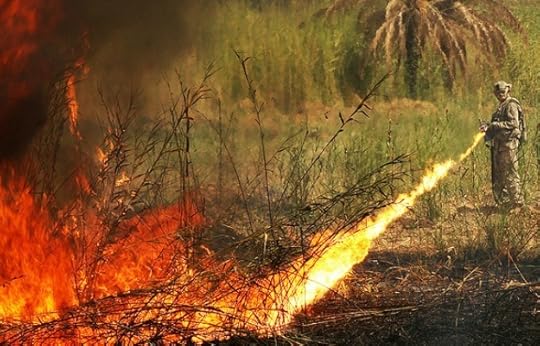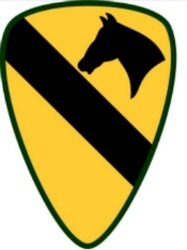Thomas E. Ricks's Blog, page 195
March 13, 2012
Why I don't think General Allen should be fired as the commander in Afghanistan

Longtime readers know that I think the U.S. military ought
to fire generals more often than it does. I think we should reward success and
punish failure. I don't think we should be "fair" to generals when the lives of
our soldiers and the nation's interests are at stake. I think we should move
out people when we think we have someone better ready to move in. I think we
should even fire generals for simply having too long a run of "bad luck."
Now, in Afghanistan, we've had a painful run. First, Marines
pissing on the bodies of enemy dead -- and
being stupid enough to video the action. Then U.S. soldiers putting Korans in
the burn pit. And then a soldier running amok and shooting Afghan civilians.
So why am I not calling on General Allen to get the big
heave-ho? Basically, I don't see a pattern of poor leadership on his part
contributing to the three events. With Abu Ghraib in Iraq, by contrast, there
was clearly a pattern of poor leadership by General Sanchez that helped create
the conditions at Abu Ghraib. But I don't see that here. And while he has had
some bad luck, it has not been long enough by itself to justify jettisoning
him.
In addition, he might be just about the best guy to deal
with these problems. From what I saw in Iraq, I suspect he may be the most
culturally sensitive combat general we have. So, if he retains the confidence
of his superiors, both military and civilian, I think he should remain.
Why can hawks live with a nuclear North Korea and Pakistan but not with Iran?

By "An Old
Soldier"
Best Defense
office of nuclear skepticism
Why
is a nuclear armed Iran unacceptable,
when an already nuclear-armed North Korea and Pakistan are?
In
order to buy into the Iran exception (the other two being the rule, and
now India, a third, has morphed into a rule maker) you have to
believe that Iran is perfidious and powerful. The former is true, and the
latter is not. Iran
is also not crazy or eager for the end of the world. Watch what they
do, not what they say.
Israel
has a nuclear monopoly. They are deluded into thinking that they can keep
this monopoly permanently. The GoI also has to brush up on the
theory of deterrence. It worked for the U.S. and USSR, it works for China and
the U.S., and it will work for Israel and Iran -- especially because Iran is not crazy.
A
nuclear Iran is not good, and not preferable, but it is not the end of the
world. To bomb makes little sense and may be the policy equivalent of committing
suicide out of the fear of death.
"An Old Soldier" is just that. Dammit. Where's
Terry Allen when we need him?
Trouble in Tarmiyah

Tarmiyah, a little town on the west bank of the Euphrates
about 30 miles north of Baghdad, is one of the leading indicator towns in Iraq.
When Tarmiyah is unhappy, it tends to mean that rural Sunnis are feeling
pressure of some sort, I think. There was a
rough little fight there that I wrote about in The Gamble. I mention it now because there was a
gunfight with police there the other day, and an attack on the mayor's
office.
March 12, 2012
Some reflections on the Vietnam War after visiting where my battalion was cut off and surrounded near Hue during Tet '68

By Charles Krohn
Best Defense department
of Vietnam War analysis
I found the place where we buried 11
U.S. soldiers in February 1968, improving chances of my battalion escaping
encirclement undetected. Despite expectations of some traumatic
flashbacks, I found the experience more provocative than distressful.
I thought about our dead soldiers and former comrades, but my sorrow hasn't
changed from then until now. Time and distance seem irrelevant.
Reflecting later at the hotel in Hue
with the Red Flag flying in the background from the Citadel, I thought about
how much the Vietnam I knew during Tet '68 changed physically. Maybe it
changed other ways as well, or perhaps I was too unsophisticated then
to see the Vietnamese as I do now. One thing's for sure: The nuances
have changed completely. Not only are there no Americans on the roads, in the
air or in the fields, doing what Americans do, the Vietnamese seem
perfectly in control of their own destinies. Maybe they were then too, but
we were too driven to notice. Accomplishing the mission was everything.
This makes me think about the American Way of War -- maybe best expressed as "you
move over, we're taking over." Despite our good intentions, sometimes I think
our various invasions are unwise, unproductive, and indecisive. If we had
provided material assistance, I suspect the South Vietnamese would have made a
good showing of themselves without our fighting the fight for them or looking
over their shoulder to make sure they were following our doctrine, rather than
their indigenous impulses.
Portraying the Ia Drang fight as a success for our side and an NVA failure may
be one of the greatest mistakes in the history of warfare. But it set the pace,
for better or worse. Westmoreland was wrong about pinning his hopes for victory
on body counts and attrition, because the end result was to strengthen the
North Vietnamese while sapping the strength of our allies in the South. Simply
put, I ride with Sorley when he makes the argument that Westy's strategy
dragged us backward in time. The only thing to celebrate about the battle
at Ia Drang was valor.
Given Westmoreland's strategy, our response to Tet '68 was predictable, and
perhaps the choices were few, but the die was already cast.
Even now we are trying to influence outcomes in Afghanistan by sending in
more trainers. Is this effective or does Afghanistan merely accept our
presence to leverage the resources we provide in hopes of stabilizing Karzai's
government in Kabul?
Looking back, I think the way we entered the Vietnam War was horribly flawed
by hubris, perhaps a defining American quality, and perhaps connected to notions of
exceptionalism. Surely the way Ambassador Bremer tried to manage the fiasco in
Iraq adds weight to this argument.
Perhaps we invaded Iraq with an insufficient force because size does matter
when one country invades another, especially with plans to rebuild the nation.
But there's something to be said for objectivity and proportionality after the
shock of invasion fades.
Looking around me now, I see the Vietnamese building their country with energy
unparalleled in my experience. I doubt Ho Chi Minh had any influence over
the destiny of the country, other than to unite it. My private wish is that I had
the historical depth to compare the final outcome of our civil war with
theirs.
Charles A. Krohn is the author of
The Lost Battalion of Tet
. Now retired to Panama
City Beach, Florida, he
served in Iraq in 2003-2004 as public affairs adviser to the director of the
Infrastructure Reconstruction Program, and later as public affairs officer for
the American Battle Monuments Commission.
Why are we still in Afghanistan?

I don't know. I have a hard time understanding this war. I
know why we went in, and I thought it was the right thing to do, and still do.
But since about 2002, this war has seemed adrift, and since 2005, since the
government of Pakistan went into opposition, it has been getting messier and
messier.
A female deputy of the 1st Cavalry division

The Army announced
on Friday that a female brigadier general would become a deputy commander of
the 1st Cavalry Division. This is the first time I can remember that
happening. It strikes me as a moment of cultural significance for the Army,
given that active-duty divisions are kind of the soul of the Army. Also, I
think her husband
currently is a DCG of the 1st Cav. So this also may be the first
time a wife succeeds a husband in the post.
"Brig. Gen. Laura J. Richardson, commanding general, U.S.
Army Operational Test Command, Fort Hood, Texas, to deputy commanding general,
1st Cavalry Division, Fort Hood, Texas."
March 9, 2012
Small unit firefights in Vietnam, Iraq and Afghanistan: Results of a DARPA review

By Zail
Coffman
Best Defense
ASSUALT (Agency for the Study of Small Unit Actions, Literature and Training)
A reader "from
one of our formerly rebellious southern states" wondered
about comparisons between the last few major conflicts. In fact, a few
years ago Jack Stuster and I conducted a
study for DARPA to examine the widely held belief that surviving a few
firefights enhances soldiers' and Marines' likelihood of surviving later,
prolonged exposure to combat. The objectives of the
study were to test the hypothesis concerning the relationship between
experience and long-term survival in combat, and to identify factors with training
implications that contribute to casualties and survival during firefights.
We reviewed more than 400 accounts of
military firefights, finding 208 that provided sufficient detail for analysis.
We formed a database of firefight experience encoded for 88 variables
(operational, environmental, outcome, etc.); becoming quite familiar with the
genre we came to call "Lieutenant Lit." We also conducted personal interviews
and correspondence with a sample of highly-experienced combat veterans. The
database includes engagements from 1966 to 2009 and includes U.S. Army, Marine
Corps, Naval Special Warfare, several actions involving coalition partners and
accounts from the Soviet-Mujahedeen war.
Statistical analysis of the data found
substantial evidence to support the study's primary hypothesis. We determined that,
on average, mission outcome improves following units' third firefight and
survival rate improves following units' fourth engagement. In addition, we
identified survival factors, casualty factors, and lessons learned from the
database of firefight accounts, interviews, and correspondence with subject
matter experts. We found five categories of skills, knowledge, and behaviors
and listed them in order of their contribution to survival during firefights:
Weapons Proficiency, Situational Awareness, Tactics and Drills, Cover and
Concealment, and Leadership/Communications. Nothing new (humans have been at
this for a few thousand years), but our methods allowed us to statistically
determine the criticality of the first four engagements, identify specific
examples of the skills and behaviors that contribute to casualties and
survival; and quantify the relative significance of the factors and place
them in order of priority.
Unfortunately, the research proponents moved on to
other assignments and the project was terminated after its initial phase. An
article describing the study results was approved for public release and has
been accepted by the Proceedings of the Naval Institute but publication
has been hanging fire for some months now. Distribution of the project report
is limited to US Government personnel.
Zail
Coffman, a Vietnam veteran, is a technical writer in Gaviota, California,
which, like Dustin Hoffman and Paul Giamatti, you probably have driven through
without even knowing it. I know I have.
Rebecca's War Dog of the Week: There's just something about Bernie

By Rebecca Frankel
Best Defense Chief Canine Correspondent
In the day-to-day bulletins of service-dog news, you'll find
a fair amount of rote notices, a fair few of them MWD retirement headlines
which are often accompanied by action shots and highlights from the dog's career
no matter how long. These tributes are part of the MWD tradition and a great
indication not only of the dogs' contribution on and off the field but also
their high standing in the military community.
Still, the announcement
I came across this week for MWD Bernie, an 11-year-old Belgian Malanois with "warm
eyes and a wagging tail" stationed at of the Marines Corps Air Station
in Arizona, stood out. So infused is each line with love and admiration, it challenges
even the most affectionate of sendoffs. It begins:
Her faded grey hair
doesn't seem to do justice to her charming and energetic personality. ... There's
more to Bernie than meets the eye. She's not all teeth and sensitive nose, she
is indeed a special girl."
But the glowing report is not only the fueled by its author,
Cpl. Aaron Diament, though he does include an ample note where he describes how
the Bernie personally won him over with her "loyalty, kindness" and a "slobbery
kiss." Indeed, the devotion to Bernie appears to be widely felt by her fellow
Marines, in part perhaps because she was a one-station dog; MCAS Yuma was her
"only permanent duty station." Bernie deployed twice, both times to Iraq where
she became a "veteran of the Battle of Fallujah," and
twice she returned home to the same kennel.

Diament reports that "the majority of [Bernie's]
handlers chose to stay with her for several years at a time" and they've
all been vying to adopt her. But in the end it was Cpl. Bret Reynolds, her most
recent handler, who will bring Bernie home to a life of play, sleeping bedside,
and watching episodes of her favorite show, "Animal Planet."
The pair has been together for nearly three years and
according to Reynolds, Bernie, who was his first explosives dog, is the "only
girl I'm allowed to love other than my wife." To him, their bond between is
sacred.
Trusting her with my
life is one of the biggest commitments I've ever made. Trusting someone who
doesn't speak, who can't tell you what she feels, trusting her with my life on
bomb threat calls has been huge and something I'll always take with me."
Farewell to a Navy pilot/blogger

"Neptunus Lex"
died recently
when his F-21
Kfir crashed at Fallon Naval Air Station in Nevada.
Farewell.
What is going on with the generals in charge of the Georgia National Guard?

Lotsa allegations
flying around.
Thomas E. Ricks's Blog
- Thomas E. Ricks's profile
- 436 followers



